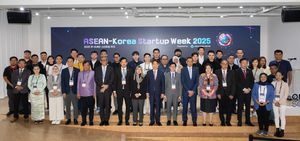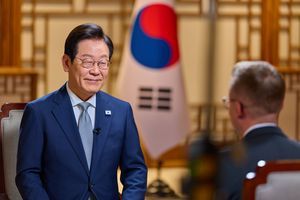![Choi Seong-ryong (center), the head of a civic group representing the families of those abducted by North Korea, says his group will no longer send anti-Pyongyang leaflets across the inter-Korean border at a press conference in Paju, Gyeonggi Province, Tuesday. (Yonhap)]](https://contents-cdn.viewus.co.kr/image/2025/07/CP-2023-0309/30471910.jpg) A civic group representing the families of those abducted by North Korea announced Tuesday it will no longer send anti-Pyongyang leaflets across the inter-Korean border, after the South Korean government requested that it discontinue the campaign.
A civic group representing the families of those abducted by North Korea announced Tuesday it will no longer send anti-Pyongyang leaflets across the inter-Korean border, after the South Korean government requested that it discontinue the campaign.
The abductee families’ group had a phone conversation with Vice Unification Minister Kim Nam-jung on June 23. During this call, Kim conveyed the government’s sympathy for their plight and requested they suspend the leaflet campaign. The Unification Ministry reported that Kim also pledged to consider the abductee families’ perspectives on the matter.
A day after the conversation, Choi’s group declared its intention to stop sending the leaflets.
The group also called on other civic organizations to follow their lead.
Since the Moon Jae-in administration agreed to discontinue loudspeaker broadcasts of anti-regime propaganda at the border in 2018, leaflet campaigns have become a primary method for civic groups to disseminate information against Pyongyang and expose North Koreans to outside realities. While loudspeaker broadcasts resumed in 2024 during heightened inter-Korean tensions, they were halted last month shortly after President Lee took office.
However, these leaflet campaigns have sparked intense debate in South Korea. While many South Koreans condemn North Korea’s ongoing human rights violations and nuclear programs, a significant portion of the public believes that the leaflets escalate tensions on the Korean Peninsula, potentially doing more harm than good.
In 2020, North Korea severed communications with the South, citing the leaflets as the reason. A survey conducted by local broadcaster KBS in June of that year revealed that 60.6 percent of respondents believed civic groups should cease distributing the leaflets.
Another poll by Real Meter in the same month showed that 50 percent of respondents thought sending anti-Pyongyang leaflets should be made illegal, while 41.1 percent opposed the idea of a legal ban.










Most Commented